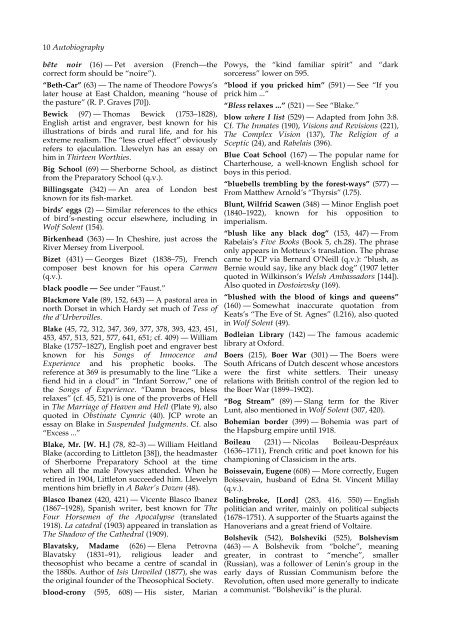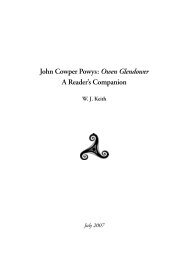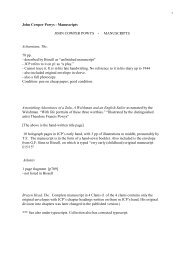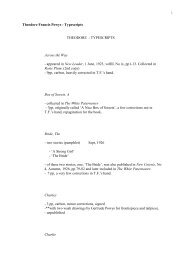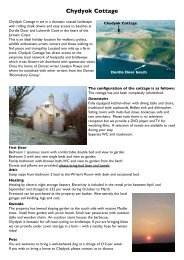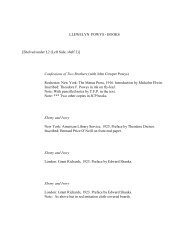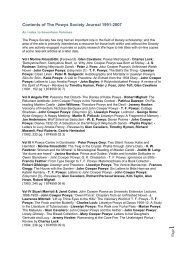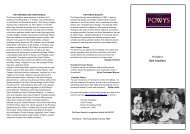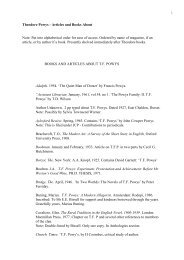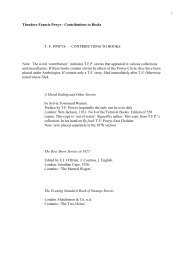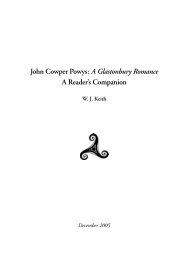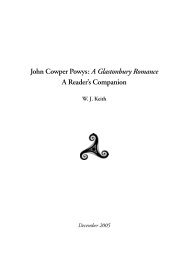J. C. Powys' Autobiography: A Reader's Companion - Site POWYS
J. C. Powys' Autobiography: A Reader's Companion - Site POWYS
J. C. Powys' Autobiography: A Reader's Companion - Site POWYS
You also want an ePaper? Increase the reach of your titles
YUMPU automatically turns print PDFs into web optimized ePapers that Google loves.
10 <strong>Autobiography</strong><br />
bête noir (16) — Pet aversion (French—the<br />
correct form should be “noire”).<br />
“Beth-Car” (63) — The name of Theodore Powys’s<br />
later house at East Chaldon, meaning “house of<br />
the pasture” (R. P. Graves [70]).<br />
Bewick (97) — Thomas Bewick (1753–1828),<br />
English artist and engraver, best known for his<br />
illustrations of birds and rural life, and for his<br />
extreme realism. The “less cruel effect” obviously<br />
refers to ejaculation. Llewelyn has an essay on<br />
him in Thirteen Worthies.<br />
Big School (69) — Sherborne School, as distinct<br />
from the Preparatory School (q.v.).<br />
Billingsgate (342) — An area of London best<br />
known for its fish-market.<br />
birds’ eggs (2) — Similar references to the ethics<br />
of bird’s-nesting occur elsewhere, including in<br />
Wolf Solent (154).<br />
Birkenhead (363) — In Cheshire, just across the<br />
River Mersey from Liverpool.<br />
Bizet (431) — Georges Bizet (1838–75), French<br />
composer best known for his opera Carmen<br />
(q.v.).<br />
black poodle — See under “Faust.”<br />
Blackmore Vale (89, 152, 643) — A pastoral area in<br />
north Dorset in which Hardy set much of Tess of<br />
the d’Urbervilles.<br />
Blake (45, 72, 312, 347, 369, 377, 378, 393, 423, 451,<br />
453, 457, 513, 521, 577, 641, 651; cf. 409) — William<br />
Blake (1757–1827), English poet and engraver best<br />
known for his Songs of Innocence and<br />
Experience and his prophetic books. The<br />
reference at 369 is presumably to the line “Like a<br />
fiend hid in a cloud” in “Infant Sorrow,” one of<br />
the Songs of Experience. “Damn braces, bless<br />
relaxes” (cf. 45, 521) is one of the proverbs of Hell<br />
in The Marriage of Heaven and Hell (Plate 9), also<br />
quoted in Obstinate Cymric (40). JCP wrote an<br />
essay on Blake in Suspended Judgments. Cf. also<br />
“Excess ...”<br />
Blake, Mr. [W. H.] (78, 82–3) — William Heitland<br />
Blake (according to Littleton [38]), the headmaster<br />
of Sherborne Preparatory School at the time<br />
when all the male Powyses attended. When he<br />
retired in 1904, Littleton succeeded him. Llewelyn<br />
mentions him briefly in A Baker’s Dozen (48).<br />
Blasco Ibanez (420, 421) — Vicente Blasco Ibanez<br />
(1867–1928), Spanish writer, best known for The<br />
Four Horsemen of the Apocalypse (translated<br />
1918). La catedral (1903) appeared in translation as<br />
The Shadow of the Cathedral (1909).<br />
Blavatsky, Madame (626) — Elena Petrovna<br />
Blavatsky (1831–91), religious leader and<br />
theosophist who became a centre of scandal in<br />
the 1880s. Author of Isis Unveiled (1877), she was<br />
the original founder of the Theosophical Society.<br />
blood-crony (595, 608) — His sister, Marian<br />
Powys, the “kind familiar spirit” and “dark<br />
sorceress” lower on 595.<br />
“blood if you pricked him” (591) — See “If you<br />
prick him ...”<br />
“Bless relaxes ...” (521) — See “Blake.”<br />
blow where I list (529) — Adapted from John 3:8.<br />
Cf. The Inmates (190), Visions and Revisions (221),<br />
The Complex Vision (137), The Religion of a<br />
Sceptic (24), and Rabelais (396).<br />
Blue Coat School (167) — The popular name for<br />
Charterhouse, a well-known English school for<br />
boys in this period.<br />
“bluebells trembling by the forest-ways” (577) —<br />
From Matthew Arnold’s “Thyrsis” (l.75).<br />
Blunt, Wilfrid Scawen (348) — Minor English poet<br />
(1840–1922), known for his opposition to<br />
imperialism.<br />
“blush like any black dog” (153, 447) — From<br />
Rabelais’s Five Books (Book 5, ch.28). The phrase<br />
only appears in Motteux’s translation. The phrase<br />
came to JCP via Bernard O’Neill (q.v.): “blush, as<br />
Bernie would say, like any black dog” (1907 letter<br />
quoted in Wilkinson’s Welsh Ambassadors [144]).<br />
Also quoted in Dostoievsky (169).<br />
“blushed with the blood of kings and queens”<br />
(160) — Somewhat inaccurate quotation from<br />
Keats’s “The Eve of St. Agnes” (l.216), also quoted<br />
in Wolf Solent (49).<br />
Bodleian Library (142) — The famous academic<br />
library at Oxford.<br />
Boers (215), Boer War (301) — The Boers were<br />
South Africans of Dutch descent whose ancestors<br />
were the first white settlers. Their uneasy<br />
relations with British control of the region led to<br />
the Boer War (1899–1902).<br />
“Bog Stream” (89) — Slang term for the River<br />
Lunt, also mentioned in Wolf Solent (307, 420).<br />
Bohemian border (399) — Bohemia was part of<br />
the Hapsburg empire until 1918.<br />
Boileau (231) — Nicolas Boileau-Despréaux<br />
(1636–1711), French critic and poet known for his<br />
championing of Classicism in the arts.<br />
Boissevain, Eugene (608) — More correctly, Eugen<br />
Boissevain, husband of Edna St. Vincent Millay<br />
(q.v.).<br />
Bolingbroke, [Lord] (283, 416, 550) — English<br />
politician and writer, mainly on political subjects<br />
(1678–1751). A supporter of the Stuarts against the<br />
Hanoverians and a great friend of Voltaire.<br />
Bolshevik (542), Bolsheviki (525), Bolshevism<br />
(463) — A Bolshevik from “bolche”, meaning<br />
greater, in contrast to “menche”, smaller<br />
(Russian), was a follower of Lenin’s group in the<br />
early days of Russian Communism before the<br />
Revolution, often used more generally to indicate<br />
a communist. “Bolsheviki” is the plural.


